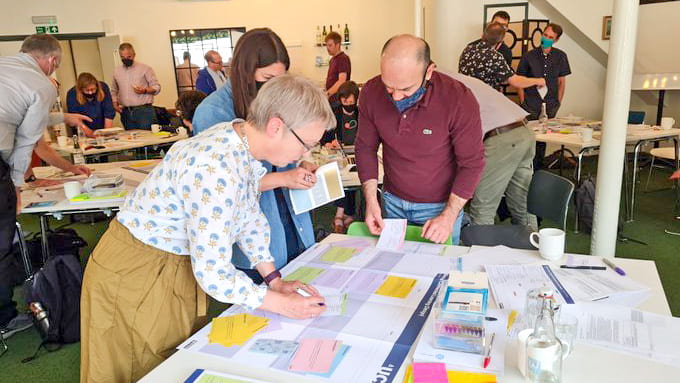A ‘whole of programme’ approach to assessment
Designing assessment across a programme of study supports ongoing student progression and self-directed learning.
What is a ‘whole of programme’ approach?
A ‘whole of programme’, or what is often referred to in the literature as a ‘programme-level’ approach, is a strategic approach to designing a cohesive assessment framework at the programme level, rather than focusing solely on individual courses. Within the current context of the two-lane approach to assessment, this enables colleagues across a programme to determine the placement of assessment to foster learning, track development over time, and make credible high-stakes decisions.

Module-focused design often fails to address issues such as over-assessment at the module level and a lack of programme-level coherence.1
This encourages students to view assessments as isolated events rather than a developing progression, which makes it difficult to assess “outcomes that focus on slowly-developed, complex, and high order skills and understanding.”2 or to support student self-dependency.
The programme-level approach relates to coherent and ongoing assessment throughout a programme, but it can involve much more than that. According to Prof. Cees van der Vleuten at Maastricht University, programme-level assessment is a way of viewing assessment that requires rethinking the roles of both student and teacher, and places assessment for learning at the centre, not assessment for passing or failing a course.
The role of the teacher is traditionally to grade a student’s performance on a single task, whereas in a programme-level approach the focus is on collecting multiple ‘data points’ over time, relating to the student’s progression towards a goal. In the approach, no single task provides sufficient information, so a pass or fail is not awarded on single tasks, but only when a sufficient number of data points have been collected to form a decision. The role of the teacher is to provide information (feedback and feedforward) on how a student’s progress is tracking. It is more of a coaching role than an assessor role.
The student’s role is to develop increasing awareness and responsibility for their own learning. In some cases, the student may be encouraged to set their own data points, or to request coaching at a specific point. Self-directed learning is a central principle of programme-level assessment.
Video: In this EDLAB interview, Prof. Cees van der Vleuten explains the vision of programmatic assessment at the University of Maastricht.
Why is it important for the Curriculum Framework?
A number of the objectives contained within the Curriculum Framework Taumata can be supported by taking a more ‘whole of programme’ approach to assessment design. Two such objectives are:
- Providing opportunities for students to shape their learning experiences that reflect their talents, ambitions and objectives, including intersecting areas of disciplinary specialisations and study beyond discipline.
- Integration of sustainability, transdisciplinary, innovation and entrepreneurship research and activity in the curriculum.
If learning is integrative, it then follows that assessment should be too. Students should have the opportunity, through an assessment, to demonstrate that they have met the learning outcomes that span a number of courses in a particular term or across a whole year.
In relation to learning and teaching design, a key objective of the Curriculum Framework is to reduce the overall volume of assessment to create space for greater authenticity of task, and ensure workload is sustainable for staff and students. As part of their preparatory work to identify teaching and learning priorities, faculties have been asked to review how they might:
- Develop/interrogate programme-focused assessment strategies
- Design integrative assessments (an assessment that covers more than one course, a whole semester or an end of stage)
‘Whole of programme’ approach to assessment in practice
Curriculum mapping in Business and Economics’ first-year undergraduate core courses
Using curriculum mapping to maintain coherence across an interdisciplinary core and create a consistent student experience.
Related resources
- A Conceptual Model for Program-Level Assessment (an article by Nicholas Charlton, and Richard Newsham-West, written for Higher Education Research & Development).
- Transforming the Experience of Students through Assessment Project (TESTA).
- Designing Programmes for Learning – Foundations (Conference recordings, University of Nottingham) – see in particular the final recording ‘Transforming the student experience through assessment (TESTA) method, institutional impact and future’ (Dr Isabel Hopwood, University of Bristol, and Dr Rachel Horrocks-Birss, University of Dundee).
- Designing Assessment Across a Programme (Chapter 4 in downloadable book Assessment and Feedback in Higher Education: A Guide for Teachers, by Teresa McConlogue).
Page updated 10/11/2025 (shifted focus from ‘programmatic assessment’ to ‘whole of programme’ approach)

